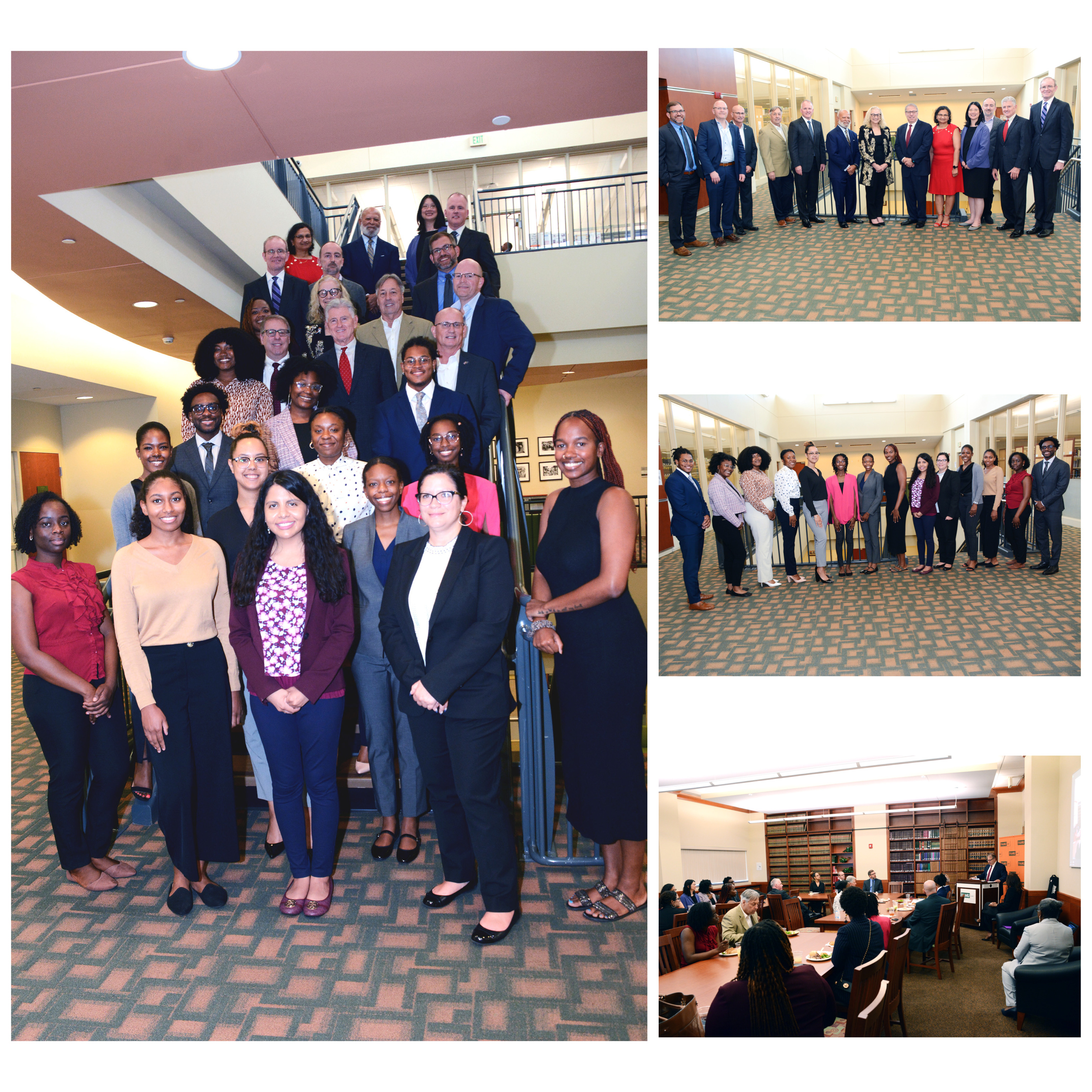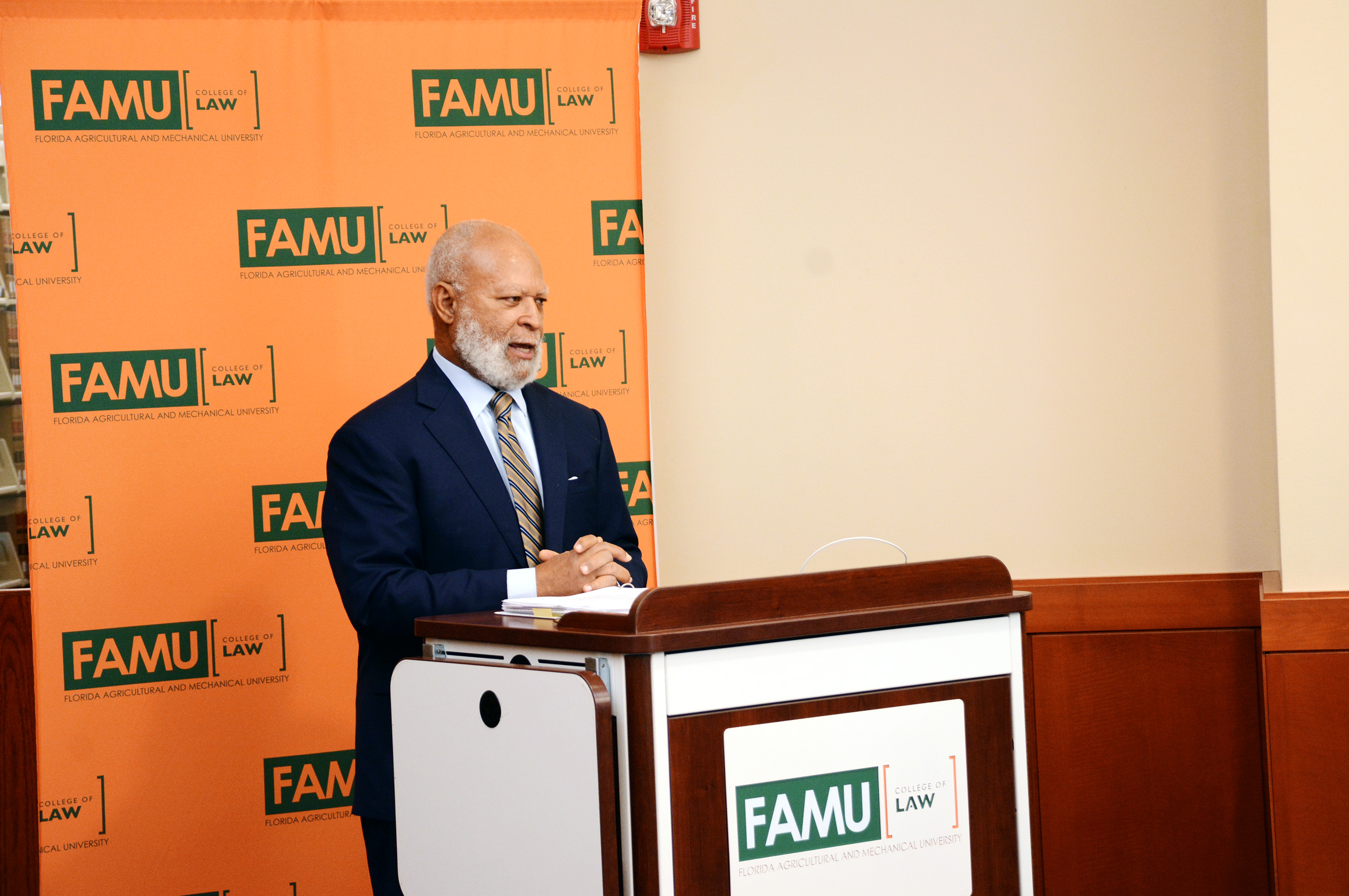Mentoring Program
Goals and Purpose of Mentoring Program
- Assist law students with matriculating law school
- Connect law students with legal and governmental community
- Shorten learning curve for law students to be practicing attorneys
- Socialize law students to local practice customs and behaviors
- Impart professionalism and ethics for law students
- Share professional values and techniques with law students
FAMU Law Mentoring Program
Law Student Mentoring Program Flyer

FAMU Law Wraps-Up Third Year of Mentoring Program with Advice from Judge Emerson Thompson
Judge Emerson Thompson, a senior justice with the Ninth Judicial Circuit and a retired judge with the Fifth District Court of Appeal, shared insights on professionalism and ethics as the keynote speaker for the Mentoring Program Recognition event at Florida A&M University College of Law on Friday, April 14, 2023.
Thompson called on the law students in attendance to take full advantage of the opportunity to be mentored by experts in the legal profession. He said he counsels his mentees to “tell me what you want me to do to help you,” and then “to show up.”
FAMU Law presented certificates to recognize all 64 lawyers and law students who participated in the 2022-2023 program that began in September and included virtual and face-to-face group sessions as well as individual mentor and mentee interactions. Mentors included nine judges from the Circuit Court, the District Court of Appeal, and the U. S. District Court, along with attorneys from across the state of Florida, Illinois, and California.
Featuring more than 40 mentors from the legal community and mentees from the law student body, the recognition event wrapped up the third year of the mentoring program, which is sponsored by the law school’s Dean’s Advisory Council in coordination with the Office of Career Planning and Professional Development. The program is directed by Kim Crag-Chaderton, an instructor in FAMU Law’s Legal Clinic.
The Mentoring Program is now accepting applicants for the 2023-2024 academic year. All FAMU Law students are eligible but limited slots are available on a first-come, first-serve basis. Mentors interested in participating must be practicing attorneys in good standing with a state bar, have a minimum of 10 years of experience, have no pending complaints or disciplinary action, and have no 10-year disciplinary history with a state bar.

More Information About Mentoring Program
- Mentoring
- Promotes legal, professional and ethical development.
- Provides mentees with access to local legal community
- Shape the future of the practice of law
- Personal satisfaction and growth
- Gives back and pays forward to the legal profession
- Mentors and Mentees
- Educate and learn from each other on legal related topics
- Help understand each other’s strengths and weaknesses
- Learn about the business of practicing law
- Network and access to legal community, for the present and future
- Practicing as an attorney or judge licensed to practice law
- In good standing with a state bar
- Minimum of 10 years experience in field
- No pending complaints or disciplinary action
- No 10 year disciplinary history with a state bar
- Mentors must be available for in person program requirements
- Full-time or part-time student at Florida A&M University College of Law
- Soft cap of 15 students per class year, with fill-ins subject to hard cap
- Hard cap of 45 students total
- Advisor, coach and counselor
- Networker and introducer
- Advise students on studying for Florida Bar
- Connect students with legal and governmental community
- Help transition students from law school into attorneys
- Advise students on local practice customs and behaviors
- Counsel students on professionalism, reputation and ethics as attorneys
- Share professional values and techniques
- Encourage and reassure mentee when needed
- Assist student on selecting area of law and successful path
- Coach student on interview process
- Discuss treatment of privileged information
- Share “war” stories from practice on failures, obstacles and successes
- Allow student to observe practice situations, depositions, mediations etc
- Respect student’s individuality and avoid assumptions
- Discuss life/work balance, perspectives and values
- Mandatory Requirements
- Attend Kick-Off Meeting to greet and meet Mentors/Mentees
- Meet in person no less than four (4) times during the school calendar year
- Attend at least one of two group mentoring meetings with preset topic during the school calendar
- Signs agreement to abide by program, including a liability waiver provision
- Attend Year End Meeting of Mentors/Mentees (with Sponsors)
- Update program and pairs of new employment/internships during program year
- Mentors will alert committee of mentees’ lack of participation
- Optional Requirements
- Attend OCBA or voluntary bar association meeting together
- Attend Depos/Mediations/Trials/Arbitrations/Closings/Meetings
- Shadowing opportunities with mentor and others, including judges, and government officials
- Appropriate social events
- Attend charitable events
- Observe court proceedings as well as meet with judges, clerks, and judicial assistants
- Suggested Topics for In-Person Meetings
- Professionalism in the court room and law firm
- Conflicts of interest and client confidentiality
- Acting as local counsel and co-counsel
- Independence and accountability for actions
- Practice areas – pros and cons
- Law firms, government and other employment
- Hanging your own shingle vs. working for a firm
- Public vs. private sectors
- Hearsay exceptions/evidentiary issues
- Motions and how to succeed at them
- Ethical and professional dilemmas
- Client engagement and closing letters
- Negotiating and drafting legal contracts
- Trust fund accounts and use of interest
- ADR – arbitration and mediation
- Business of practice of law
- Dress code/ courtroom etiquette
- Communication with clients/courts/opposing counsel
- Law firm culture
- Managing future finances/billing
- Management of law school finances/student debt
- Managing case loads
- Emerging areas of law
- Completion of the Florida bar application
- Florida Bar preparation and passage
- Stress management and risk of substance abuse
- Work-life balance and prioritization
- Transitioning from law student into an attorney
- Job search/interviews




